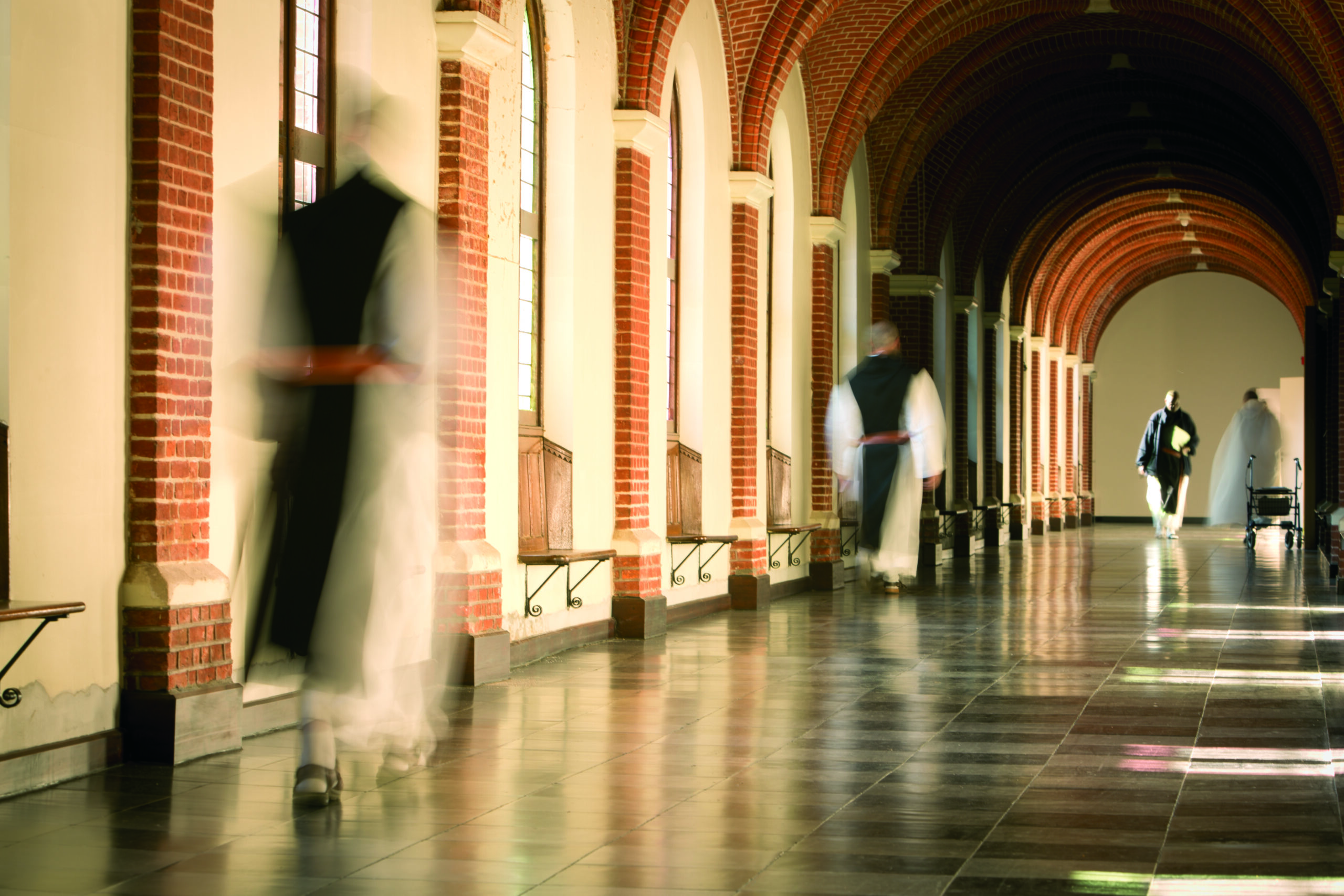
Life as a monk at Westmalle Abbey
Living together in silence, prayer and work
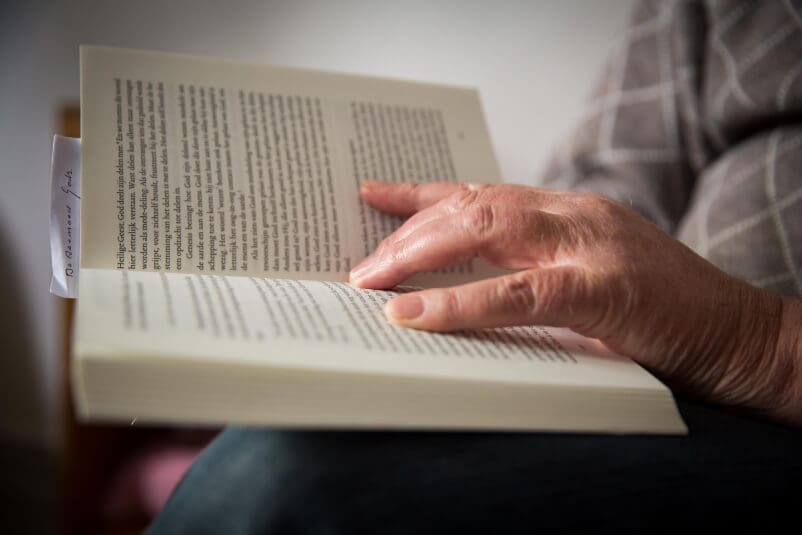
Living in and from God’s presence
Throughout time, monastic life has remained largely unchanged. At Westmalle Abbey, it is no different. Here, monks live, pray and work together in silence, just as they have done for many centuries. They persevere in their ceaseless attempt to live in God’s presence. They encounter God in every brother monk and in everything that happens every day. They do this through prayer, but also through hard work, as they follow the Rule of St Benedict. These pages will give you a first glimpse of life at the abbey.
Praying is listening
When you think of the word ‘pray’, you may immediately think of a ‘prayer of request’ in which you ask for something and hope that your prayers will be answered. However, prayer is, above all, listening: it is about being open and grateful for what is given to you. It is a way to detach yourself from your daily worries and in doing so come closer to God. This is precisely why prayer occupies such a central place for the monks of Westmalle. They meet six times a day to pray: the first time as early as 4.00 am, during a communal vigil.
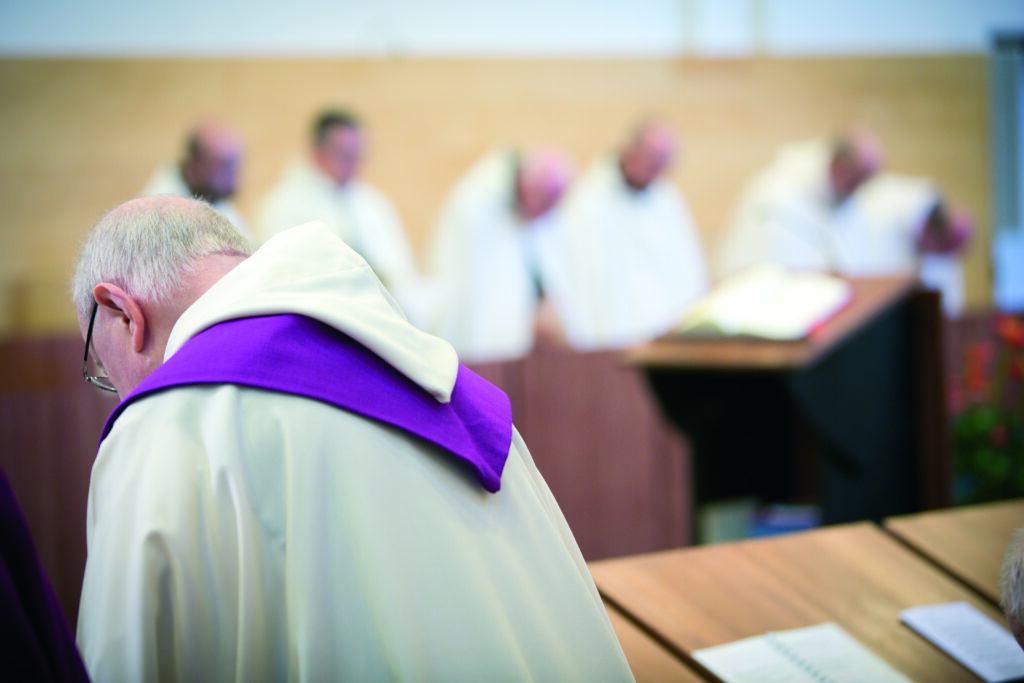
Choral prayers and the Eucharist
The times when the monks come together to pray follows a rhythm that is called the ‘Book of Hours’. During the third hour of the day –morning prayers – the Eucharist is celebrated. At that moment, the monks commemorate the death and resurrection of Jesus. The monks mainly pray using words from the Psalms and Old Testament hymns that are usually chanted. The Psalms give them the words to chant the world’s or their own issues out loud– these are their choral prayers.
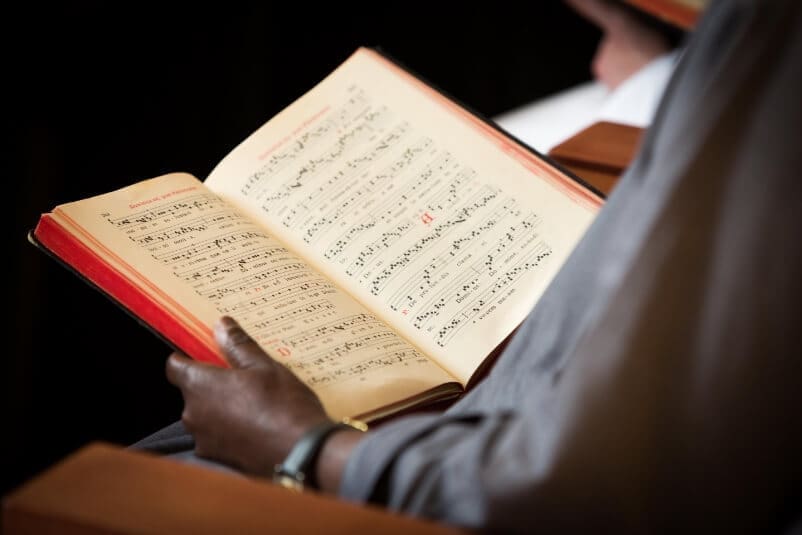
Personal prayer and reading
By praying together, the monks amplify the power of their prayer. However, monks must always pray, in an endless effort to live in God’s presence. For instance, there are moments provided for personal prayer: moments for the monks to acknowledge their own weaknesses and allow them to be purified by God. In addition, the ‘lectio divina‘ is also important: the discovery of God’s word through much focused reading.
Rolling up their sleeves
The monks of Westmalle follow the Rule of St Benedict. That also means they have to work. After all, Benedict believed that monks should not be idlers, but should be responsible for their own livelihood. Labour also contributes to personal development, which is the basis for spiritual growth. Working also allows the monks to express themselves creatively. That work can take many forms and often involves manual labour. But the monks also carry out administrative tasks and other forms of work.
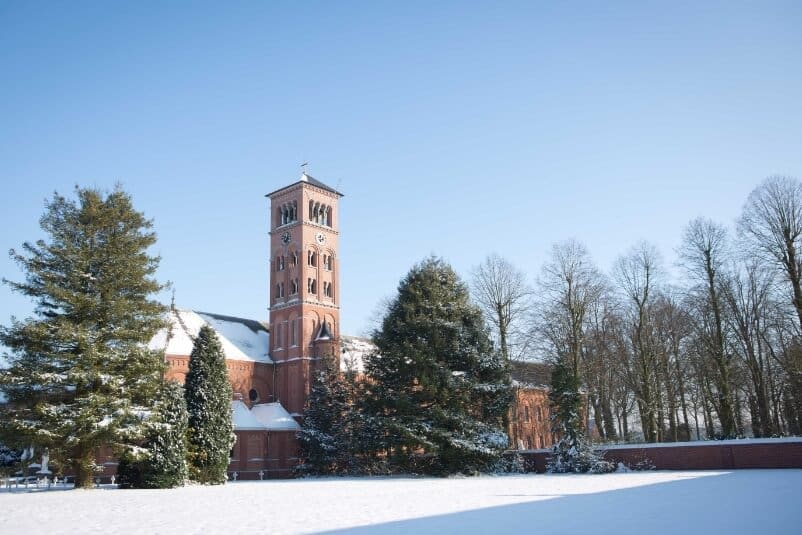
Self-sufficiency
Perhaps Westmalle Abbey is best known for its brewery, but the monks make a living in many other ways, too. For example, you will also find a farm, a bakery and a cheese dairy within the abbey walls. Only the beer and cheese are sold; the bread is primarily for the monks and their guests. The farm mainly supplies milk to make Trappist cheese.
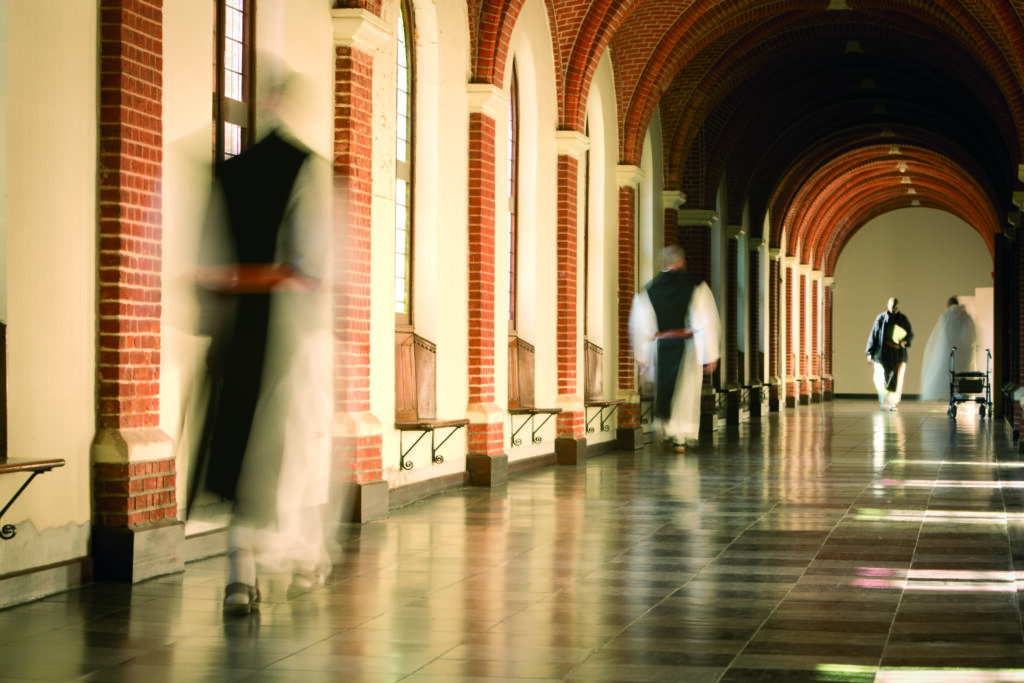
Service to the community
For the monks, labour means service to the community. The income from the brewery serves not only for subsistence, but also to aid with hospitality and to engage in charitable works. For example, Westmalle Abbey helps other, needier monasteries and supports developmental projects at home and abroad. Within the abbey, service to the community also means caring for sick and elderly brother monks.
Continuing to grow and learn
The abbey community constitutes a training school for Christian charity. And when we say ‘school’, we mean ‘a place of learning’. Monks work constantly on their spiritual growth by praying and working. In addition, Father Abbot helps them with spiritual instruction. The monks see him not only as a fellow brother, but also as the representative of Jesus in their community. He personally accompanies each of them on their path to self-knowledge and the healing of their weaknesses.
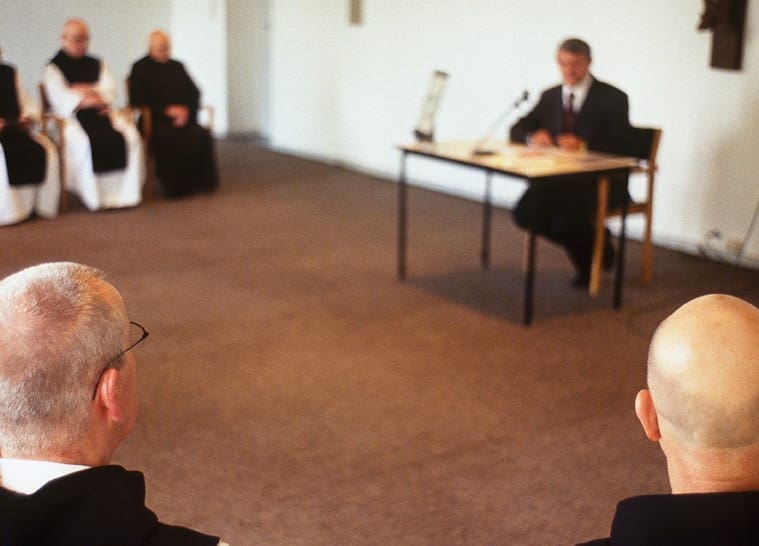
Weekly chapter meeting
The monks gather at least once a week for a chapter meeting. This meeting is usually chaired by the Abbot, although sometimes guest speakers from outside the abbey are also invited. During the chapter meeting, spiritual matters or current topics of concern to the abbey community are discussed. Incidentally, the term ‘chapter’ comes from the custom of discussing a chapter from the Rule of St Benedict.
Eating together
The Westmalle monks always eat together as one big family. During the meal, their spirit is also nourished, because a reading is given from a book. Often it is a religious work, but texts from current affairs or secular culture are also discussed. The food itself is frugal, but nutritious and sufficient. In this way, St Bernard’s words are fulfilled at the table: “Keep your body healthy to better serve God.”
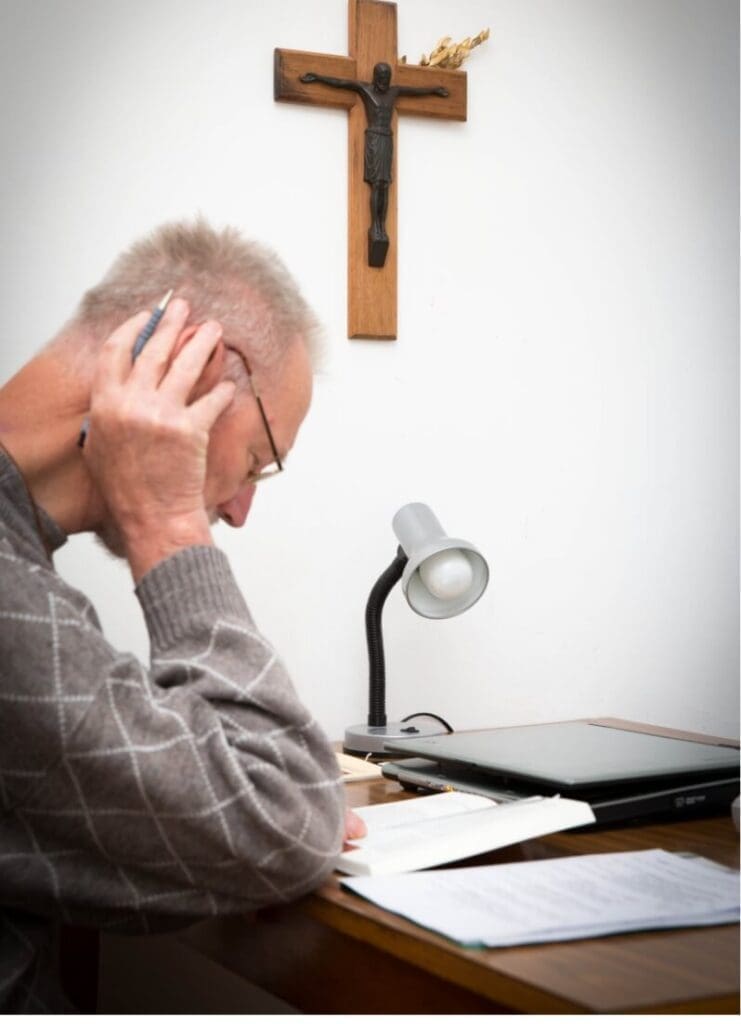
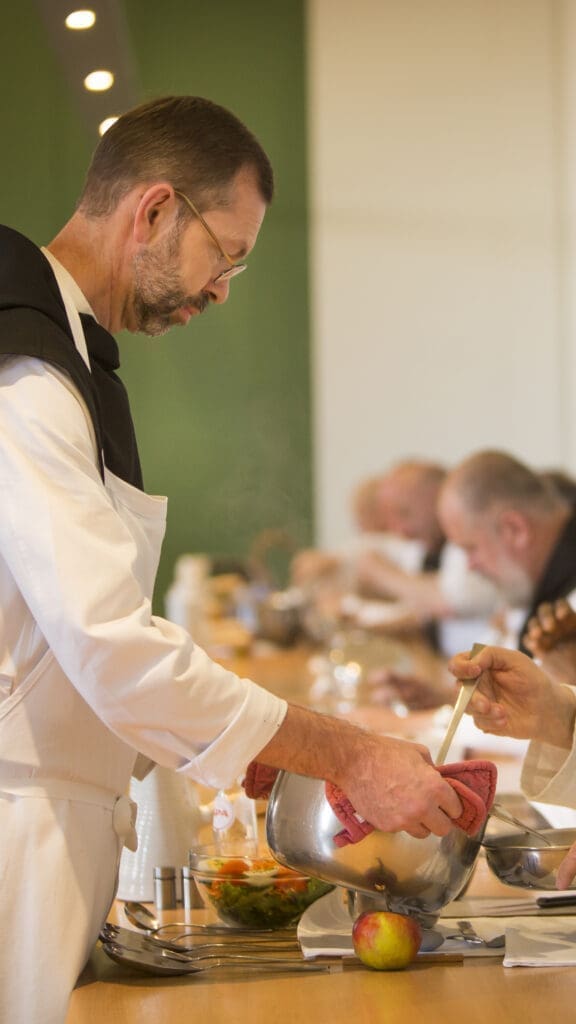


Living in silence
Silence has become a rare commodity in our world, but it is a crucial part of monastic life. Westmalle monks spend most of their day in silence. This is not easy, but they can always count on the Abbot’s support to help them. Combined with the regularity of life at the abbey, silence also helps with reflection. The Word of God is only truly heard when there is silence.






Becoming a monk
Sometimes a person feels called to follow the voice of his heart and join the abbey community, but becoming a monk is not something you can just do. It is preceded by a probation and training period of at least five years. The road to solemn profession – the final step – takes place in a number of different stages. This involves a thorough check at every step to see whether the candidate is still motivated to become a monk and whether he has the necessary mental and emotional maturity to continue.
First contact
The candidate presents an honest picture of his background during an initial interview with the novice master. Certain issues from his past may need to be clarified, sometimes in a therapeutic context but sometimes not.
Purging motivations
A great deal goes on within the candidate. What motivates them to search for God? The novice master helps to purify these motivations. This requires a bond of trust to grow between the candidate and novice master.
Training period in the abbey community
If the candidate is ready, he is invited to stay in the abbey guesthouse for a few days and discover the rhythm of the abbey. This period may be followed by a longer stay to enable the candidate to become involved in the community.
Entry into the abbey: postulate
On the day of entry, the postulate begins: a period of initiation and gradual familiarisation with Cistercian life. Depending on personal growth, the postulate lasts four to five months, followed by an assessment.
Novitiate
This is followed by the novitiate, which lasts two years. The candidate receives the white habit of the Cistercians and often a new name. During this period, the candidate – now a novice – experiences Cistercian life in a deep, personal way.
Temporary profession
At the end of the novitiate, the novice pronounces his temporary vows: a one year commitment, which he may repeat three times. He is given his own responsibilities and may already be able to devote himself to philosophical and theological studies.
Solemn profession
After at least three years of temporary profession, the brother may ask the Abbot to pronounce his solemn vows. He then binds himself permanently to the community, its location and the order. This solemn profession is not an end point, but the beginning of a process that lasts a lifetime. The brother is not only given his own task in the abbey, but will continue to mould himself by praying, working and participating in community life.
The vows of the monks
After a five-year probation and training period, a candidate for monastic life takes four vows: those of poverty, obedience, monastic life and stability. By doing so, he binds himself to the community, the locality and the order. From then on, the monk must fulfil these vows every day.
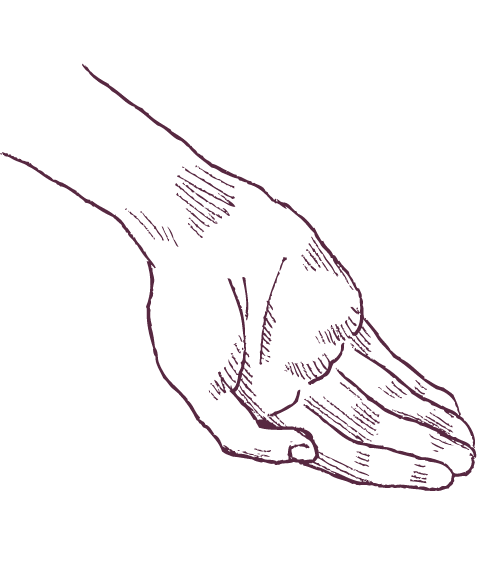

POVERTY
All possessions are common and shared. The monk strives for austerity and simplicity: he renounces everything unnecessary.
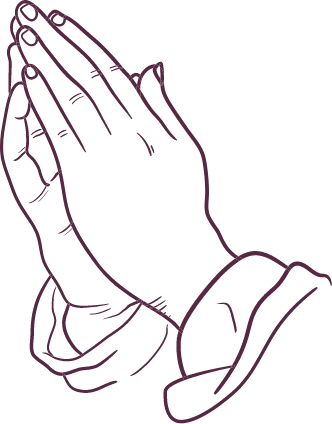

OBEDIENCE
Monks are always open to loyal dialogue with their fellow brothers and the Abbot. They contribute to peace in the community by respecting the Abbot’s decisions.


MONASTIC WAY OF LIFE
Covetousness and selfishness are curbed and refined into kindness and modesty. This creates an atmosphere of affection, piety and respect in the community.
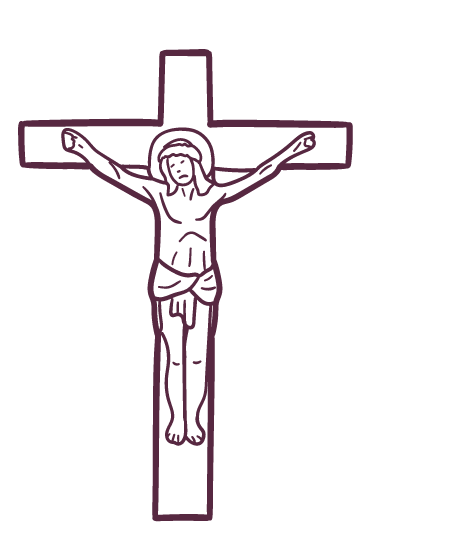

STABILITY
The monk binds himself to the community he enters. Only for serious reasons may he change communities. If that happens, a new probationary period and new vows will follow.
Want more info?
Do you have questions about a possible vocation? Do you wish to meet to discuss the various options? Contact our training leader and novice master using the form below or mail directly to br_samuel@abdijwestmalle.be.